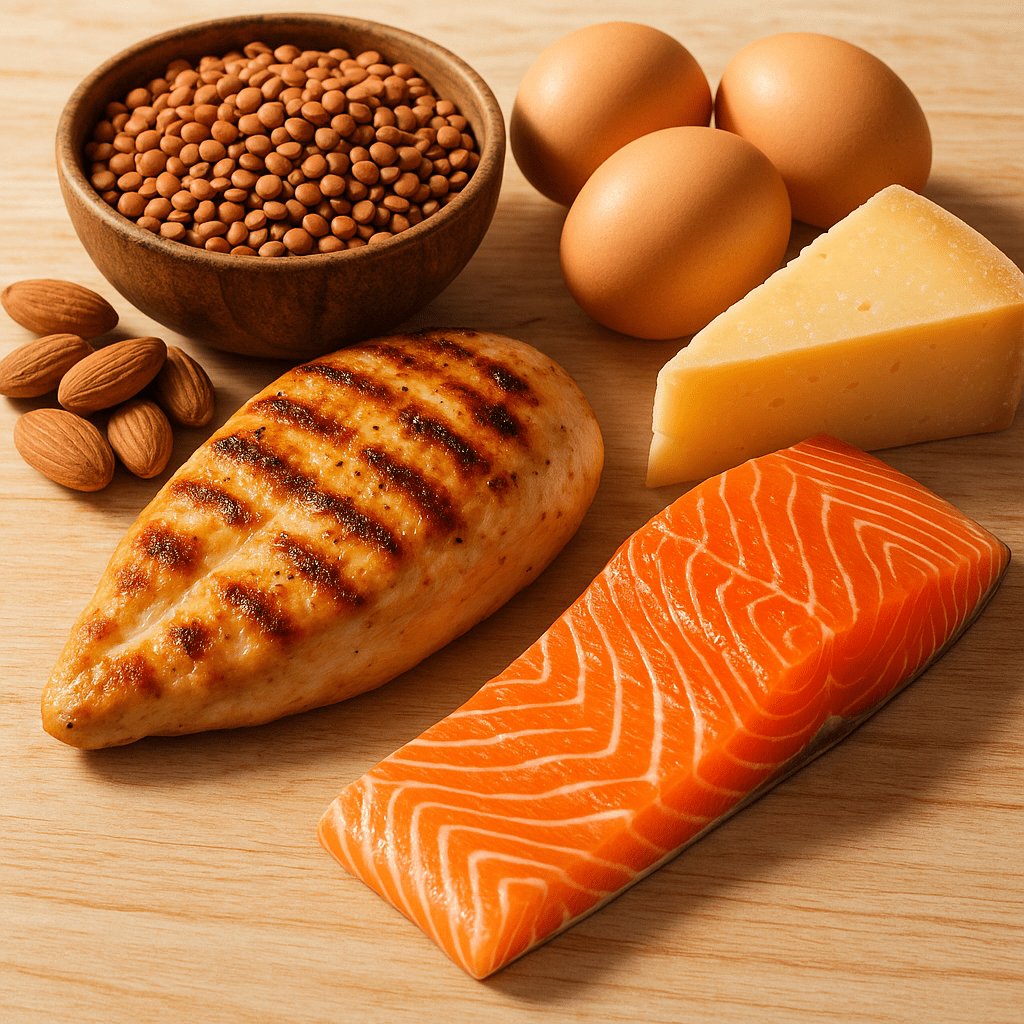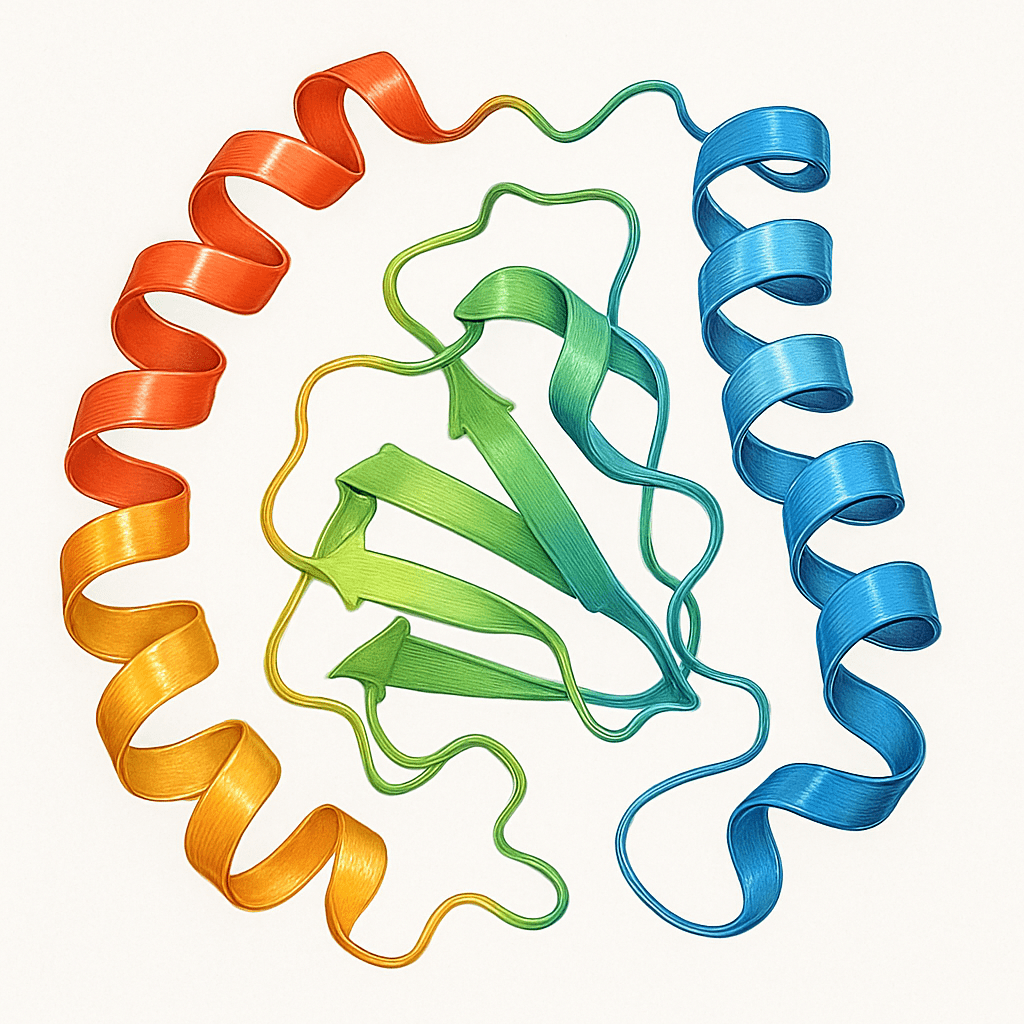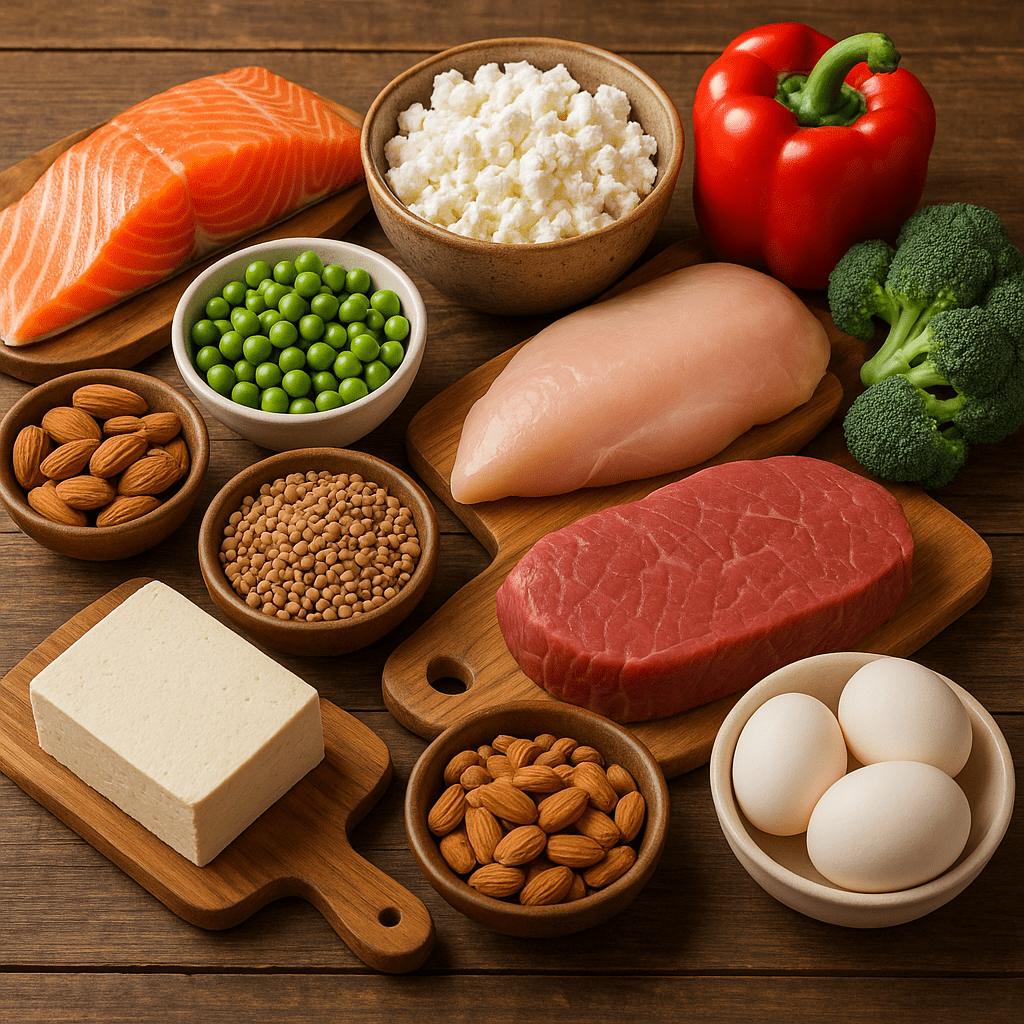Every movement our bodies make, every tissue they regenerate, every immune defense we have to thank for all of these processes. These complex compounds are the basic “building blocks” of our bodies, responsible for the continuous functioning and renewal of our bodies.

Proteins are involved in almost every physiological process, from muscle growth to immune defense, from transporting substances in the blood to hormone regulation. Despite the importance of protein, many of us are unaware of how much we actually need each day and which sources best meet our individual needs.
In this article, we will explore what protein really is at the molecular level, what key functions it performs in our bodies, what its importance is for maintaining health, and how to ensure optimal protein intake in your diet. You will learn about different protein sources, their role in weight management and muscle growth, and when protein supplements may be beneficial. Find out how to choose protein wisely based on your health goals and lifestyle. Learn more about a balanced diet in our health and wellness articles.
What is protein and why is it necessary?
Proteins are large, complex molecules made up of smaller units called amino acids.

Unlike carbohydrates and fats, proteins are not the primary source of energy, but their significance for the body is much broader and more fundamental. Proteins make up about 20% of the human body mass and are the most important component of tissues, organs, hormones, enzymes and antibodies.
Amino acids are the main building blocks of proteins. Of the more than 20 known amino acids, 9 are considered essential (essential), which the body cannot synthesize independently and must obtain from food. These amino acids are:
- leucine
- isoleucine
- valine
- lysine
- methionine
- phenylalanine
- threonine
- tryptophan
- histidine
According to the recommendations of the World Health Organization, the function of proteins in the body includes a number of processes, including:
- tissue growth and repair
- production of enzymes and hormones
- support of immunity
- transport of substances
- energy supply (when carbohydrates are lacking)
- regulation of water balance
What are amino acids?
Amino acids are organic compounds that form the basis of proteins. They are divided into essential (essential), which the body must obtain from food, and non-essential, which the body can synthesize itself. Different combinations of amino acids give proteins a wide range of functions and properties, depending on their structure and arrangement in the protein chain.
All amino acids are important for the body’s functions, but essential amino acids require special attention when creating a nutritional plan, especially for those who follow special diets, such as vegetarians and vegans. Discover our range of quality protein supplements that can help supplement your diet with essential amino acids.
Key health benefits of protein
Sufficient protein in the diet has many positive effects on our body. Why do we need protein? Here are the main areas of protein benefits, confirmed by scientific research and recommendations from health professionals.
Protein and Muscle Growth
One of the most well-known functions of protein is its role in muscle growth and repair. Protein consumed after exercise:

- helps to repair damaged muscle fibers faster
- stimulates the synthesis of new muscle proteins
- improves muscle strength and endurance
- prevents muscle loss (prevention of sarcopenia)
It is especially important to ensure sufficient protein intake for active athletes, seniors, and those who are trying to maintain muscle mass while following calorie-restricted diets.
Protein and immunity
Protein consumption is directly linked to strengthening the immune system. Immune cells, antibodies, and other components involved in the body’s defense against infections are made up of protein. Insufficient protein intake can lead to:
- weakened immunity
- increased susceptibility to infections
- longer recovery time after illnesses
A properly balanced diet with enough protein can help maintain optimal immune function. Read more about nutrients that strengthen immunity here.
Protein and Weight Management
Protein consumption is an important factor in controlling body weight for several reasons:
- Feeling of satiety – protein keeps you feeling full longer than carbohydrates or fats, therefore reducing the desire to snack
- Thermogenic effect – the body uses more energy to digest protein (20-30% of protein calories) than carbohydrates (5-10%) or fats (0-3%)
- Preservation of muscle mass – helps maintain muscle during weight loss, which ensures a more active metabolism
Numerous studies confirm that diets with higher protein content are more effective in losing weight and maintaining the achieved results in the long term.
Protein and hormone regulation
Many hormones are protein in nature or require protein for their production. Among these hormones:
- insulin – regulates blood glucose levels
- growth hormone – stimulates growth and cell renewal
- thyroid hormones – regulates metabolism
- sex hormones – participate in the maintenance of reproductive functions
A sufficient amount of protein in the diet ensures the normal functioning of the hormonal system and helps maintain the body’s homeostasis.
Protein and skin health
The skin is the largest human organ, the main structural element of which – collagen – is made up of proteins. A high-quality protein diet helps:
- maintain skin elasticity and firmness
- heal wounds faster
- renew skin cells
- fight signs of aging
In addition to collagen, proteins are also involved in the production of other important skin components, such as elastin and keratin.
How much protein do you need daily?
Recommendations by age, gender and activity
Protein needs depend on many factors – age, gender, physical activity, health status and individual goals. The World Health Organization and other authoritative institutions provide recommendations that can help you get an idea of how much protein your diet should contain.
General recommendations for adults:
- Minimum amount: 0.8 g of protein per 1 kg of body weight per day
- Moderately active individuals: 1.0-1.2 g/kg per day
- Active athletes: 1.4-2.0 g/kg per day
- Professional athletes: up to 2.2 g/kg per day
However, different age groups and stages of life require different amounts of protein:

Age Group/Condition Recommended Protein Intake (g/kg body weight)
Children (1-3 years) 1.05-1.2
Children (4-13 years) 0.95-1.0
Adolescents (14-18 years) 0.85-1.0
Adults (19-64 years) 0.8-1.2
Elderly (65+ years) 1.0-1.5
Pregnant women 1.1 (first trimester) – 1.3 (third trimester)
Breastfeeding women 1.1-1.3
For example, an adult weighing 70 kg should consume at least 56 g of protein per day (0.8 g x 70 kg). Meanwhile, a moderately active person weighing 70 kg should aim for 70-84 g of protein per day (1.0-1.2 g x 70 kg).
Consequences of protein deficiency
Insufficient protein intake can cause various health problems:
- decrease in muscle mass and strength
- slow wound healing
- weakened immune system
- hair, skin and nail problems
- edema (fluid accumulation)
- constant fatigue
- in more severe cases – protein-energy
- malnutrition (marasmus, kwashiorkor)
Protein deficiency is especially dangerous for children, as it can disrupt normal growth and development. Read more about the importance of vitamins and minerals for muscles and joints here.
Best sources of protein: animal and plant
Protein can be obtained from a variety of foods, which are divided into animal and plant sources. Each group has its own advantages and characteristics regarding protein quality, amino acid composition and absorption.
Animal sources of protein
Animal proteins are generally considered to have high biological value because they contain all the essential amino acids in an optimal ratio. Main sources of animal protein:
- Lean meat (100 g):
- Chicken breast – 31 g protein
- Turkey breast – 29 g protein
- Beef (lean) – 26 g protein
- Rabbit – 25 g protein
- Fish and seafood (100 g):
- Tuna – 30 g protein
- Salmon – 25 g protein
- Shrimp – 24 g protein
- Cod – 18 g protein
- Dairy products:
- Quadratic cheese (lean) – 18 g protein/100 g
- Greek yogurt – 10 g protein/100 g
- Hard cheese – 25-35 g protein/100 g
- Milk – 3.4 g protein/100 ml
- Eggs – 13 g protein/100 g (about 6 g in one egg)
Plant-based Protein Sources
Although most plant-based proteins do not contain all the essential amino acids (with the exception of some sources such as quinoa and soy), a proper combination of various plant-based foods can provide all the essential amino acids. Main sources of plant protein:
- Legumes (cooked, 100 g):
- Soybeans – 17 g protein
- Lentils – 9 g protein
- Chickpeas – 9 g protein
- Beans – 8 g protein
- Nuts and seeds (100 g):
- Pumpkin seeds – 30 g protein
- Almonds – 21 g protein
- Chia seeds – 17 g protein
- Walnuts – 15 g protein
- Grains (cooked, 100 g):
- Quinoa – 4.4 g protein
- Buckwheat – 3.4 g protein
- Oats – 2.5 g protein
- Brown rice – 2.3 g protein
- Soy products:
- Tempeh – 19 g protein/100 g
- Tofu – 8-15 g protein/100 g
- Soy milk – 3 g protein/100 ml
Comparing Plant and Animal Proteins
There are several important aspects to consider when choosing protein sources:
- Amino acid completeness – animal proteins contain all the essential amino acids, while many plant proteins are deficient
- Digestibility – animal proteins are generally better absorbed (90-99%) than plant proteins (70-90%)
- Additional nutrients – plant proteins often contain more fiber, vitamins, antioxidants, while animal proteins contain more vitamin B12, iron, zinc
- Health effects – plant proteins are more often associated with a lower risk of heart disease, diabetes, and certain types of cancer
The optimal choice for many people would be to combine different protein sources, getting the benefits of both types. Explore natural protein supplements here that can help supplement your diet with quality protein.
Protein Supplements – Who Needs Them and What You Need to Know
While most protein needs can be met through your regular diet, there are times when protein supplements can be helpful or even necessary. It’s important to understand when they’re appropriate, which ones to choose, and how to use them safely and effectively.
What are the benefits of protein supplements?
Protein supplements may be beneficial for the following groups:
- Athletes and those who exercise actively – for greater muscle growth and faster recovery after training
- People with increased protein needs – recovering from injuries or surgeries, the elderly
- Vegetarians and vegans – as an additional source of protein
- People on calorie-restricted diets – to avoid losing muscle mass
- People with a low appetite – when it is difficult to get enough protein from food
- Very busy people – as a more convenient source of protein when there is little time to cook
Main types of protein supplements
There are various types of protein supplements on the market:
- Whey protein (Whey) – quickly absorbed, contains all the essential amino acids, ideal for use after training
- Whey concentrate (70-80% protein)
- Whey isolate (90%+ protein, less lactose)
- Whey hydrolysate (pre-partially digested)
- Casein proteins – slowly absorbed, suitable for use before bedtime for a long-term supply of amino acids
- Egg proteins – high biological value, suitable for those who are lactose intolerant
- Vegetable proteins
- Soy proteins – complete, but sometimes avoided due to phytoestrogens
- Pea proteins – hypoallergenic, suitable for those with allergies
- Rice proteins – hypoallergenic, but incomplete
- Hemp proteins – rich in fiber and good fats
- Mixtures of various plant proteins – complement each other with amino acids
What you need to know when choosing protein supplements
When choosing a protein supplement, it is important to pay attention to:
- Quality and purity – choose products without unnecessary additives, heavy metals, artificial sweeteners
- Amino acid profile – especially the amount of BCAA (branched chain amino acids)
- Digestibility – how well the body will absorb proteins
- Additional components – are there vitamins, minerals, probiotics
- Allergies and intolerances – e.g. lactose intolerance to whey protein
- Calorie content – especially important for those controlling weight
- Certificates and tests – quality certificates
It is important to remember that protein supplements are not miracle products – they are only an aid in ensuring sufficient protein intake. They should not replace a complete diet rich in natural, unpackaged foods. Strengthen your diet with quality supplements from our range.
Conclusion
Protein is an essential part of our diet, providing many vital functions in the body. Its benefits include muscle growth and repair, strengthening the immune system, regulating metabolism, hormone production and many other processes. Everyone should strive to ensure the optimal amount of protein in their diet, taking into account individual needs depending on age, physical activity and health status.
When choosing protein sources, it is worth combining both animal and plant products, thus ensuring the intake of all essential amino acids and maximum health benefits. Protein supplements can be a useful tool for certain groups, but should not replace a balanced, varied diet.
Remember that each person’s body is unique, so monitor how your body responds to different sources and amounts of protein. If you have specific health concerns or goals, it is always worth consulting with a nutritionist who will help you create an individualized nutrition plan. Visit our healthy lifestyle blog for more nutrition advice.
Frequently Asked Questions
How much protein should I consume daily?
Most healthy adults should consume 0.8-1.2 grams of protein per kilogram of body weight per day, but athletes, pregnant women, and seniors need more.
What is the difference between animal and plant proteins?
Animal proteins are complete (contain all essential amino acids), while most plant proteins are incomplete, but combining a variety of plant sources can ensure that you get all the amino acids.
Can you get enough protein on a vegetarian or vegan diet?
Yes, eating a variety of plant-based foods, such as legumes, soy, nuts, and grains, can meet your protein needs.
Is it necessary to take protein supplements?
Supplements are not necessary for most people, but they can be helpful for athletes or those who cannot meet their needs through food alone.
What happens if I don’t get enough protein?
Protein deficiency can lead to loss of muscle mass, weakened immunity, poor wound healing, and other health problems.

